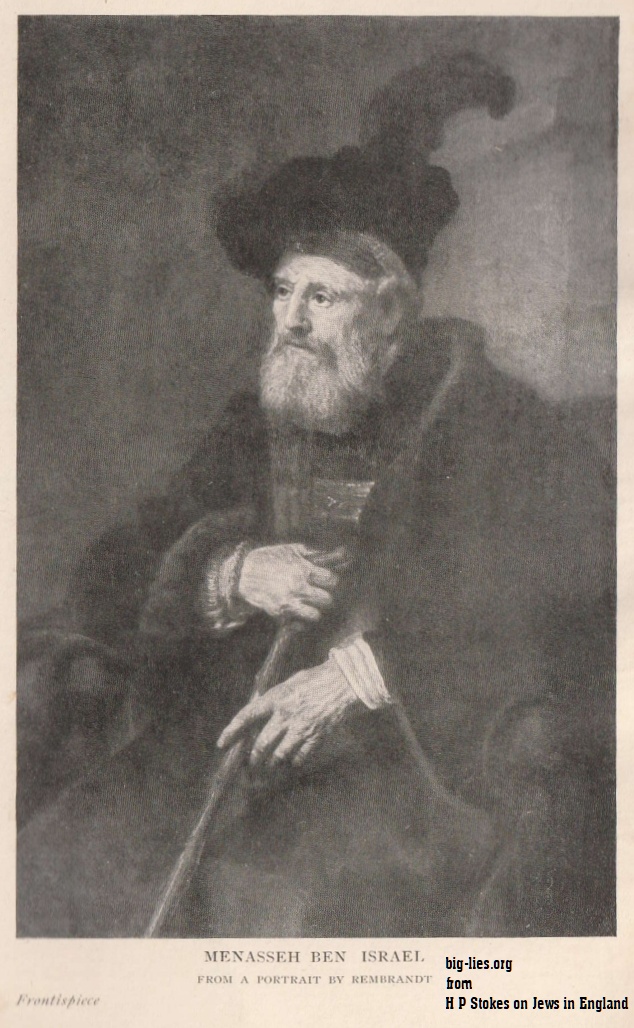
Frontispiece of Stokes's book. Note the claim that it is 'from a portrait by Rembrandt'. Reproductions of paintings were often made from re-drawn engravings, before modern techniques. But this picture seems to have been just a 'portrait of an old man'. It looks vaguely like a man dressed in Scottish style, perhaps chosen not be appear outlandish.
(Rembrandt has had an easy ride, probably because his lifetime coincided with the invasion of England. I've never seen an examination of his life it terms of Jews in the Netherlands arranging the invasion.)
The author, Canon Dr. Henry Paine Stokes (1849-1931) is shown on the title page as
THE REV. H.P. STOKES, LL.D., LITT.D., F.S.A. HON. FELLOW OF CORPUS CHRISTIE COLLEGE, CAMBRIDGE; HON. CANON OF ELY
Stokes was 'President of the Cambridge Antiquarian Society 1901-11'.
Stokes’ A Short History of the Jews in England was published in London by the Central Board of Missions, and in New York: The Macmillan Press by Society for Promoting Christian Knowledge.
On the book's spine, in gold foil, is S·P·C·K which must have been recognised by the classically educated as similar to S·P·Q·R, for the Senate and People of Rome, carried on banners by Roman armies. It must have suggested muscular Christianity.
This book was one in a series of Jewish Studies, edited by A. Lukyn Williams, D.D. (1853-1943) whose life until 1885 seems to have been lived in Sydney, Australia, after which he moved to England and lived off the Church of England. Lukyn wrote: ... It cannot be pretended that we English [sic] know much about their [Jews] post-Biblical history, practices, and beliefs, much less that we have studied these in relation to Christianity past and present. The aim of this series is to do something towards supplying this want...
So much for the pieties. What seems to be the truth here?
The publication date of 1921 postdates the publication of Belloc's book The Jews. It of course postdates not just the start, but the nominal end, of the Great War. There is no mention of Jews in Europe, or even Jews migrating into Europe and the USA in the late 1900s. Ellis Island and Winston Churchill (for example) are omitted. Anything recent is omitted, apart from a few obscure stories written by Jews.
And conversely the whole thrust of the book is to emphasise ancient stories and mythologies. The author was an antiquarian, meaning, generally, one concerned with ancient appearances, not with realistic estimates of true events. Not a genuine historian.
In the same way, the treatment generally is reminiscent of histories of Christianity in the 19th century, with little or nothing said on Christian violence, Christian tithes, and so on. Treatment of Jews says nothing Jews as medical people (though with the rise of science it was clear that many treatments were harmful). The assumption is that Jews are always innocent and harmless, for instance in Clifford's Tower in York, and the numerous reports of child murders. In short, it's a joint Christian-Jewish presentation based on previously-secure principles of censorship which Stokes took as certain.
The book starts with Jews in England 'before the Expulsion'. It seems unlikely that 'the Expulsion' can ever have been complete. It asserts that 'Jews came into England with the Conqueror'. There's a pretty complete absence of discussion of the money dealings of Jews, such as financing wars. Before we get to Cromwell, there are brief passages on the Domus Conversorum, Houses for Converts. In view of what happened in Spain and Portugal, it seems more than likely that supposed converts to Christianity were largely pretenders. Possibly these apparently small buildings provided temporary cover while Jews plotted their tricks based on Kahal principles.
It would be like asking the people who wrote and published and publicised the Harry Potter wizard stories to express their sincere belief in the truth of the stories—when, after all, they made them up themselves. The Jews in England has some pages on missions to convert Jews, though without evidences for the unlikeliness of these attempts.
Archive.org has several online scans of Stokes and this is just one of them. It's eerie to note the way in which everything malign in Judaism is ignored. There's a single reference to the Talmud or Thalamud, and mention made of 'condemnatory edicts', but nothing in Stokes is substantial.
I'll leave interested readers to look online to see if they can identify anything genuine in the book. If not, adopt the hypothesis that such books are just designed to confuse ordinary people.
Conclusion
I have to say the entire absence of serious comment, in 1921, suggests that the S·P·Q·R was a covertly Jewish operation. It's easy to see how Jewish finance would support such an organisation, keeping an eye open to suppress true but unwanted information on Jews. Bear in mind that Orthodox Christian churches, notably the Russian Orthodox, were looted by Jews, but without comment by Stokes. (Hilaire Belloc, by contrast, discussed these events with indignation, despite not liking or associating with the Orthodox churches).
So it seems the S·P·Q·R was another part of Jewish control, probably supplying money for feeble books on Christianity, designed to waste the time of readers, in accordance with long-term Jewish aims. The S·P·Q·R is still with us, wasting time, printing rubbish, appealing to weak-minded people, in exchange for a little money.
© Rae West 9 April 2022